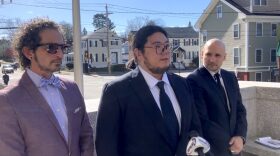Harvard, like other prestigious Ivy League schools, is a non-profit. Still, its 36-billion dollar endowment is bigger than the GDP of Jamaica. Plus, a poll finds that forty-four percent of families in low-income, low-education households with a high school athlete think their kid has a chance at the majors – we’ll hear about the myth of pro sports as viable career option. And look into the secretive underworld of illegally modified softball bats.
Listen to the full show.
Should Private School Endowments Get Taxed?
Harvard and other generously-endowed private schools are non-profits, which means their endowments—in Harvard’s case $36 billion dollars—don’t get taxed. Now a former Department of Education official is arguing it’s time to tax Harvard’s stockpile and distribute those dollars to smaller, needier schools. Jordan Weissmann is senior business and economics correspondent at Slate, where he covered the issue: Is It Time to Tax Harvard’s Endowment?
Small Debts, Big Problems
Susan Dynarski is a professor of education, public policy and economics at the University of Michigan. She’s also a frequent contributor to the New York Times blog, The Upshot where she recently wrote Why Students with the Smallest Debts Have the Largest Problem.
Related: We’re Frighteningly in the Dark About Student Debt
The Brookings Institute
WATCH: ▶ The facts behind the student debt ‘crisis’ @davidmwessel http://t.co/2yCIoajXBG #BPEA pic.twitter.com/ooNx44ptSy
— Brookings Econ (@BrookingsEcon) September 11, 2015
Icon for Access

So far today, we’ve covered whether or not the government should be able to tax Harvard’s enormous endowment, and how some types of student debt are worse than others. Creating a fair and equitable system of higher education is largely about access – but not everybody agrees on what that means, or how to grant it. There’s another form of access – access for the disabled – and not everybody agrees on what that requires either. Or even how to symbolize it.
Roman Mars from the podcast 99% Invisible brings us the story.
Listen to Icon for Access again at PRX.org
The Underground World of Illegal Softball Bats
Rick Paulas wrote for SB Nation about the secretive, innovative, juiced up illegal bats now commonly used on neighborhood softball fields across the country. The Bat Doctor is In
The Fantasy of Raising Your Kid to Be a Pro Athlete
KJ Dell’Antonia is the lead writer and editor of the New York Times Motherlode blog where she wrote about the pitfalls of fantasizing about raising a pro-athlete. Odds Are, Your Sport-Playing Child Isn’t Going Pro. Now What?
Think you’re raising a pro player or scholarship kid? You’re wrong. Now what? http://t.co/5xBxN4h5ix
— KJ Dell'Antonia (@KJDellAntonia) September 13, 2015
International Pressures, Domestic Pain
Professional sports may not be a reliable career option for many – but from race, to religion, to gender, the dogged pursuit to compete has long made sporting events a venue for social transformation. Producer Kelly Jones, from the podcast Backstory with the American History Guys brings us a story about a trailblazing athlete who helped push women’s rights onto the field.
You can listen to this story again at PRX.org.







